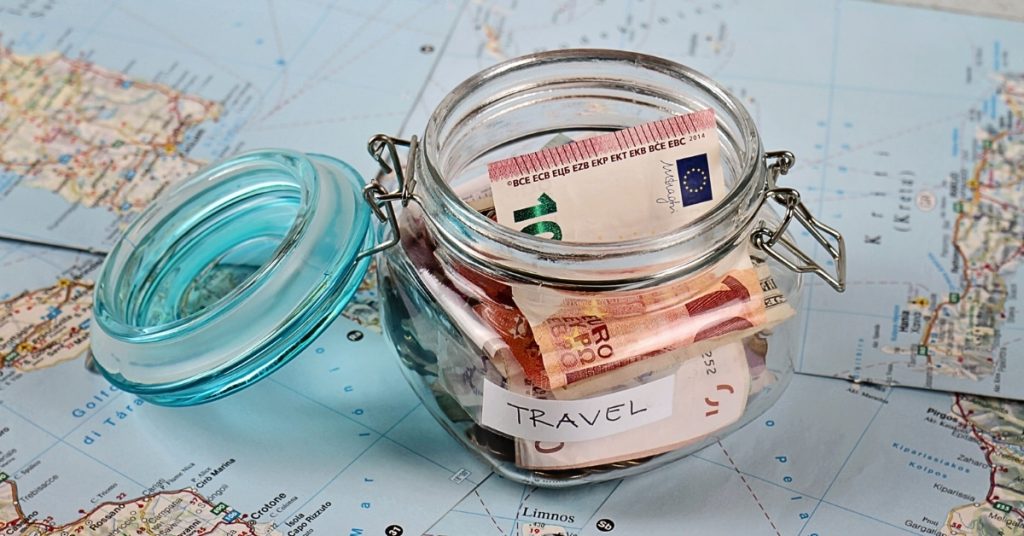Traveling abroad is an exhilarating experience, offering new cultures, landscapes, and adventures. However, international travel can also be expensive if not planned carefully. For many Americans, the dream of exploring foreign lands can seem financially daunting.
But with the right strategies, it’s possible to save effectively and make that dream a reality without breaking the bank. Here are some key considerations and tips for saving money for international travel.
Setting a realistic budget and financial goals

One of the first steps in preparing for international travel is to set a realistic budget. This involves understanding the total cost of your trip, including flights, accommodations, food, activities, and unexpected expenses.
Start by researching the average costs associated with your destination. Websites, travel blogs, and forums can provide valuable insights into the cost of living in different countries. Once you have an estimate, add a buffer for emergencies or unplanned expenses.
This approach helps avoid financial stress and ensures that you have enough funds to cover your trip without sacrificing quality. After determining the overall budget, break it down into manageable financial goals. If your trip is a year away, calculate how much you need to save each month to reach your target.
Automating your savings can be a game-changer here. Set up a dedicated savings account for your travel fund and schedule automatic transfers from your checking account. This way, you save consistently without having to think about it. Additionally, consider using budgeting apps to track your progress and stay motivated.
Another crucial aspect of budgeting is prioritizing your spending. Evaluate your current expenses and identify areas where you can cut back. This might mean reducing dining out, canceling unnecessary subscriptions, or finding more cost-effective alternatives for everyday purchases.
Leveraging travel rewards and credit card points
Another effective strategy for saving on international travel is to take advantage of travel rewards programs and credit card points. Many credit cards offer travel rewards, such as airline miles or hotel points, which can significantly reduce your travel costs.
However, it’s essential to choose the right credit card that aligns with your travel goals and spending habits. Start by researching credit cards that offer sign-up bonuses or accelerated rewards on travel-related expenses.
Some cards provide points for every dollar spent, which can be redeemed for flights, hotel stays, car rentals, and more. For frequent travelers, a card with no foreign transaction fees is also beneficial, as it saves you money on purchases made abroad.
Additionally, some cards offer travel insurance, which can protect you from unexpected cancellations or emergencies. Maximizing your credit card rewards requires strategic planning. Focus on accumulating points or miles by using your card for everyday purchases, such as groceries, gas, and dining out.
Many cards also offer bonus points for spending in specific categories, so align your spending with these opportunities whenever possible. However, it’s crucial to avoid overspending or carrying a balance, as interest charges can negate the benefits of the rewards. In addition to credit card points, consider joining airline and hotel loyalty programs.
These programs often offer perks like free checked bags, priority boarding, and room upgrades, which can enhance your travel experience while saving you money. By strategically using credit card points and rewards programs, you can significantly reduce the cost of your international trip, making it more affordable and enjoyable.
Timing your purchases and being flexible with travel plans
When it comes to international travel, timing can be everything. The cost of flights, accommodations, and activities can vary significantly depending on the time of year and how far in advance you book.
By being strategic about when you make your purchases and how flexible you are with your travel plans, you can save a considerable amount of money. Booking flights early is generally advisable, as prices tend to increase as the departure date approaches.
However, there’s a sweet spot for booking, typically around two to three months before your trip, depending on the destination. Use flight comparison websites and apps to monitor prices and set alerts for when fares drop.
Additionally, consider flying mid-week or during off-peak seasons, as these times are often cheaper. Flexibility with your travel dates can also lead to significant savings. If you’re able to travel outside of peak tourist seasons, you’ll not only find lower prices but also enjoy a less crowded experience.
For example, visiting Europe in the fall or Asia during the shoulder seasons can provide a more affordable and authentic travel experience. The same principle applies to accommodations; rates for hotels and vacation rentals are usually lower during off-peak times. Another timing strategy is to take advantage of last-minute deals.
While this approach requires a degree of spontaneity, it can lead to substantial savings on flights, accommodations, and tours. Some travel websites specialize in last-minute deals, offering discounted rates for travelers who can depart on short notice.
Exploring cost-effective accommodation options
Accommodation is one of the most significant expenses during international travel, but there are many ways to find cost-effective options without sacrificing comfort or convenience. One of the most popular strategies is to explore alternatives to traditional hotels, such as vacation rentals, hostels, or even house-sitting opportunities.
Vacation rentals, like those available on Airbnb or Vrbo, offer a home-like experience with the added benefit of kitchen facilities. By cooking some of your meals, you can save a considerable amount on dining out.
Additionally, vacation rentals often provide more space and privacy than hotel rooms, making them an excellent option for families or groups traveling together. For solo travelers or those on a tighter budget, hostels are an affordable option that also offers the opportunity to meet fellow travelers.
Many hostels provide private rooms in addition to dormitory-style accommodations, allowing you to choose the level of privacy and comfort that suits your needs. Furthermore, hostels often organize group activities or tours, which can be a great way to explore your destination while keeping costs down.
Another unique accommodation option is house-sitting, where you stay in someone’s home for free in exchange for taking care of their property while they’re away. In conclusion, saving for international travel requires careful planning and smart strategies.
By setting realistic financial goals, leveraging travel rewards, timing your purchases, and exploring alternative accommodations, you can make your dream trip a reality without overwhelming your budget. With these tips in mind, you’ll be well on your way to an unforgettable adventure that is both enriching and financially savvy.

